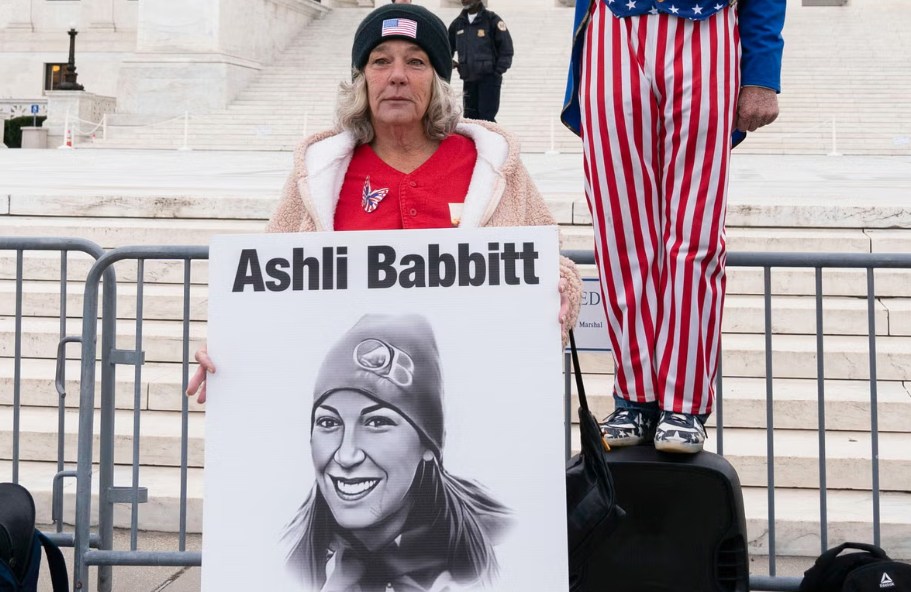WASHINGTON, D.C. — In a significant development stemming from the January 6, 2021, Capitol riot, the Trump administration has reached a preliminary settlement in a wrongful death lawsuit filed by the family of Ashli Babbitt, the 35-year-old Air Force veteran who was fatally shot inside the U.S. Capitol during the insurrection.
Attorneys representing both Babbitt’s estate and the U.S. Department of Justice filed a joint notice with a federal judge in Washington on Friday, stating that the parties have “reached an agreement in principle.” Although the final terms of the settlement remain confidential and have yet to be officially executed, this marks a pivotal moment in one of the most controversial incidents from the unprecedented attack on the seat of American democracy.
Background on the Incident
Ashli Babbitt, a California native and ardent supporter of former President Donald Trump, was among the hundreds of individuals who stormed the Capitol on January 6, 2021, attempting to halt the certification of President Joe Biden’s electoral victory. As rioters broke through barricades and security checkpoints, Babbitt was part of a group attempting to breach the Speaker’s Lobby—an area that leads to the House chamber—when she was shot by a Capitol Police officer.
The shooting was captured on video and quickly circulated online, fueling controversy, political debate, and conspiracy theories. The officer, later identified as Lt. Michael Byrd, was placed on administrative leave and subsequently cleared of wrongdoing after internal and federal investigations determined that the use of deadly force was justified to protect members of Congress and staffers sheltering nearby.
Despite these official findings, Babbitt’s death became a rallying point for far-right activists and commentators, who portrayed her as a martyr and questioned the legitimacy of the investigation. Her family, represented by a team of civil rights attorneys, filed a wrongful death lawsuit in 2022, accusing the government of excessive use of force and seeking monetary damages.
Details of the Lawsuit
The wrongful death suit alleged that Babbitt was unarmed, posed no immediate threat, and was denied her constitutional rights when she was shot. Her attorneys argued that lesser means of force could have been used and that the decision to fire a weapon under those circumstances was unjustified. The suit demanded accountability from the government and sought financial compensation for what her family described as a “senseless and preventable death.”
The U.S. government, through the Department of Justice, defended the actions of the Capitol Police, citing the extraordinary and volatile nature of the situation. Officials emphasized that the shooting took place in a high-stress environment with an ongoing threat to lawmakers’ safety, and that Lt. Byrd had acted within the scope of his duties to prevent further harm.
Settlement and Next Steps
The preliminary agreement represents a possible end to a legal battle that has drawn national attention and become emblematic of the deep divisions still lingering from the events of January 6. While the settlement’s exact financial and legal terms have not been made public, the agreement “in principle” suggests that both sides have found common ground sufficient to resolve the dispute outside of court.
Legal experts note that such settlements are not uncommon in high-profile civil rights or wrongful death cases, particularly when ongoing litigation could further inflame public tensions or reveal sensitive security protocols.
The court has given both parties a limited period to finalize and submit the complete settlement documentation. Until then, the agreement remains unofficial, and no monetary figure has been confirmed.
Political and Social Reactions
The settlement announcement has already sparked reactions across the political spectrum. Supporters of Babbitt’s family have hailed it as a step toward justice and recognition of what they view as a tragic overreach by law enforcement. Critics, however, have expressed concern that any financial settlement might lend undue credibility to false narratives surrounding the Capitol attack and diminish the seriousness of the threat posed that day.
The Department of Justice has not issued a public statement beyond the court filing, and neither Lt. Byrd nor Capitol Police representatives have commented on the matter since the initial investigations cleared him of wrongdoing.
Conclusion
As the nation continues to grapple with the legacy of January 6, the preliminary settlement in Ashli Babbitt’s wrongful death case underscores the enduring legal, political, and emotional complexities surrounding that day. It also highlights the continuing efforts by the judicial system to reconcile government accountability with the chaotic and dangerous circumstances that defined one of the darkest chapters in recent American history.
Whether the settlement brings closure for Babbitt’s family or further fuels political debate, it is a poignant reminder of the human cost of the Capitol riot—and of the ongoing challenge of restoring public trust in the institutions of American democracy.
Would you like this content tailored for a specific publication format, such as a news article, blog post, or opinion editorial?

Leave a Reply